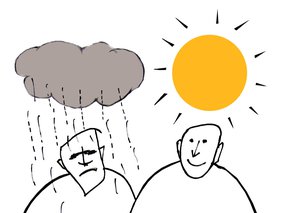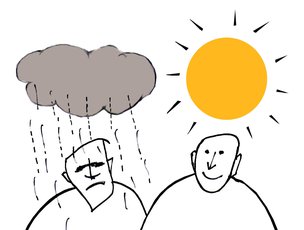In the UK, about 3% of the population is estimated to suffer from Seasonal Affective Disorder (SAD), according to The Guardian.
What is SAD?

Seasonal Affective Disorder (SAD) is a type of depression which is experienced during particular seasons or times of the year. It is commonly experienced during the winter months, when the days are shorter and sunlight is decreased, but in rare cases, it can also occur in the summer months. SAD is known to harm people's mood, sleep and appetite, which can negatively impact their lives. People with SAD may notice that their relationships and careers suffer as a result of their symptoms.
Anyone can suffer from SAD, but it is most often experienced by young women aged between 18-35. Women are estimated to be 4 times more likely to suffer from SAD than men are. If a family has a history of depression, bipolar disorder or SAD, they are also more at risk of suffering from SAD.
What are the main symptoms?
Winter SAD
- Feeling lethargic - SAD can leave people feeling sluggish, tired and apathetic leading to an increased desire to sleep.
- Increased appetite & weight gain - These two symptoms go hand in hand. If someone is seeking food for comfort they are likely to put on weight if they are not increasing their exercising. It is said that people with SAD crave carbohydrates & sugars in particular. This can contribute to reduced self-esteem.
- Having a consistent low mood - SAD commonly makes people feel unhappy, irritable and often tearful.
- Feeling antisocial - People with SAD may seek alone time more than usual and lose interest in attending social occasions, even with their closest friends & family.
Summer SAD
- Poor appetite & weight-loss - Contrary to winter SAD, summer SAD can cause a decrease in appetite which leads to weight-loss.
- Insomnia - People with summer SAD tend to find it difficult to sleep and often find that they are up all night.
What are the causes?
Scientists believe that SAD is often triggered by the decreased absence of sunlight in the winter months. This affects the levels of hormones in our brains, particularly melatonin and serotonin. The part of the brain that these hormones affect helps to control our mood, sleep and appetite, so when the levels are too high or low, these three things are negatively impacted.
What are the treatments?
- Anti-depressant medication
It is said that SAD is associated with a dysfunction in brain serotonin activity and as a result, doctors believe that antidepressants are an effective treatment for SAD. Fluoxetine, often known as Prozac, is the most popular antidepressant for treating SAD due to it being a Selective Serotonin Reuptake Inhibitor (SSRI).
To be prescribed anti-depressant medication, you will need to book an appointment with your Doctor. They will have a chat with you to assess whether they believe anti-depressants would be a suitable form of treatment for you, and if so they will provide advice and a prescription.
- Light therapy

It is widely known that SAD is typically associated with a decrease in sunlight, so the obvious solution would be to trick the brain by introducing artificial light. Lightboxes that emit full-spectrum light to mimic sunlight are available for purchase online. People have experienced the best results by sitting in front of the lightbox first thing in the morning. It is highly recommended that individuals consult their GP before attempting this form of treatment.
The image to the right shows the Beurer TL Ultra Portable Daylight SAD Light, White, which is available to purchase for £49.98.
- Vitamin D supplements
Low levels of vitamin D are associated with depression, and naturally, in the winter months, we do not get as much vitamin D from natural sunlight, which lowers our levels. It is recommended that people who suffer from depressive disorders, including SAD, take vitamin D supplements to keep their levels up.
Vitamin D supplements are available to buy at most health stores, supermarkets & pharmacies. You can view Holland & Barrett's collection of vitamin D supplements here, prices ranging from £2.99 - £31.99.
- Cognitive Behavioural Therapy (CBT)
CBT offers a great support network for people who are suffering from SAD. A therapist can help a person to understand why they are feeling the way that they are and teach techniques which can help them to overcome SAD. Techniques may include relaxation, mindfulness and journaling.
You can be referred to a CBT therapist by your GP, pay privately for CBT therapy sessions, or you can self-refer to receive free therapy through the NHS website here. There is also a charity called Mind, which offers talking therapies to people suffering from mental health illnesses. Watch the video below to find out more about what they do.
Do you suspect that someone you know might be suffering from Seasonal Affective Disorder (SAD)? It could be helpful to gently suggest that they schedule an appointment with their GP. Additionally, you can support them by being present when they feel low. For example, you could join them for an early morning walk to help them get outside and enjoy the sunlight.
Are you looking for a care service for a loved one?
Contact our Care Advisers for free, one-to-one support with your search.
Call us on 01865 638018
Send message




